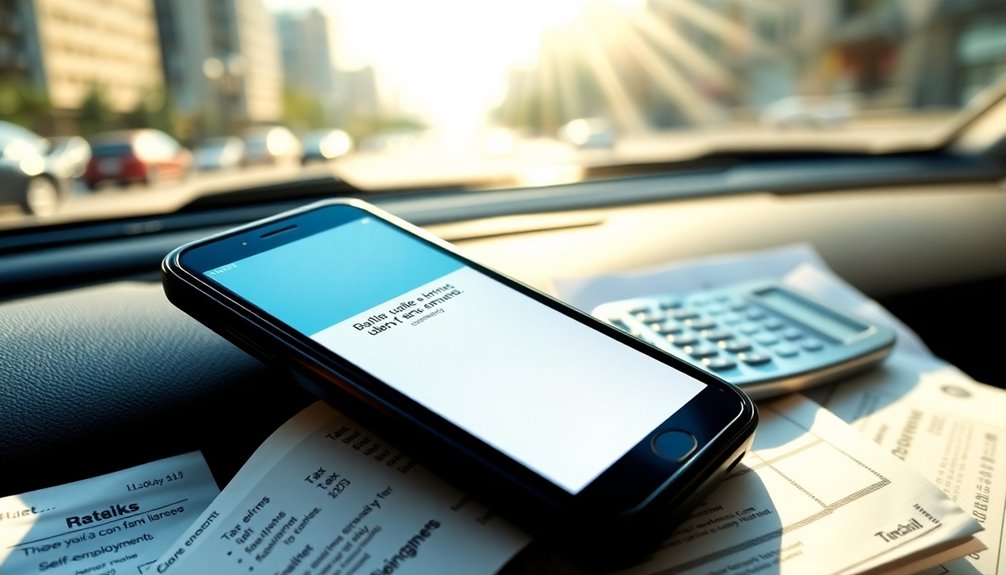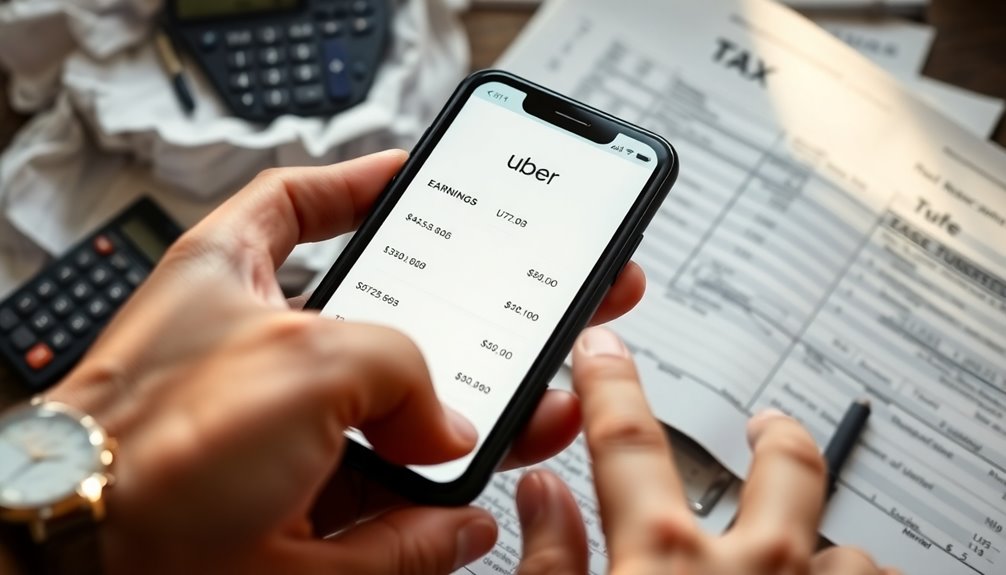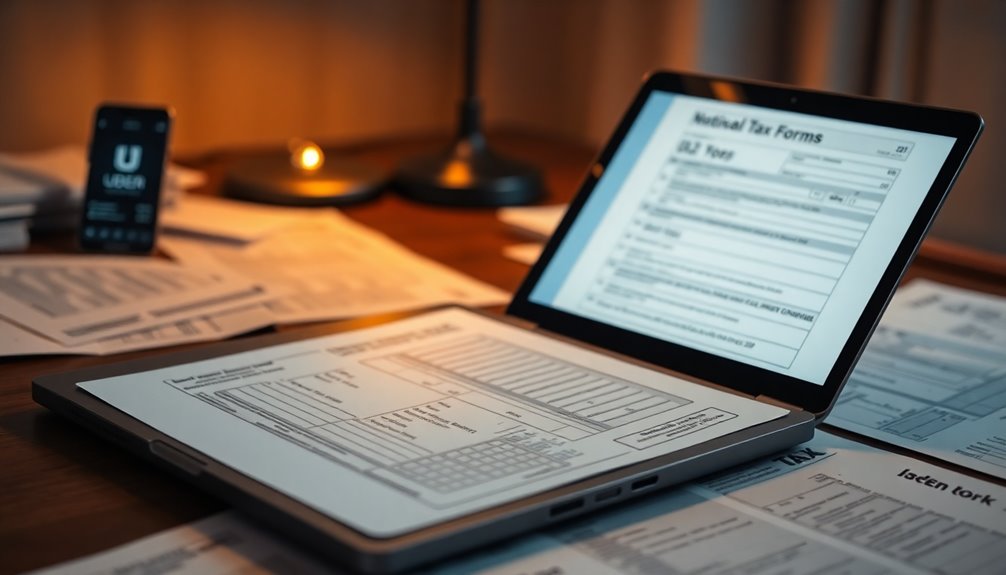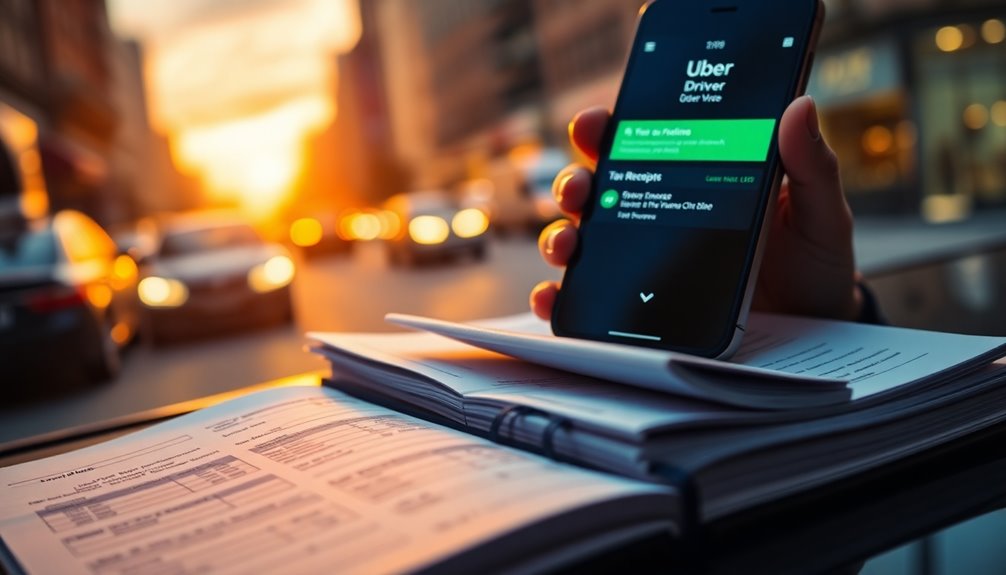Uber doesn't withhold taxes from your earnings, so you're responsible for handling your own tax obligations. As an independent contractor, you'll need to pay self-employment taxes on your net earnings and make quarterly estimated payments if you expect to owe more than $1,000 in taxes for the year. Failing to keep your tax information accurate may lead to backup withholding. Uber provides tax summaries and forms like the 1099-K to help you report your income. Taking great care with your deductions can also lower your tax liabilities. There's much more you'll want to know about managing your taxes effectively.
Key Takeaways
- Uber does not withhold federal taxes from driver earnings, classifying drivers as independent contractors.
- Drivers are responsible for their own tax obligations and must make quarterly estimated tax payments.
- Failure to provide accurate tax information may lead to a B-Notice from the IRS.
- If tax information is not updated, backup withholding of 24% may be applied.
- Independent contractors must pay self-employment taxes, which amount to 15.3% based on net earnings.
Uber's Tax Withholding Practices

When you drive for Uber, it's important to understand that the company doesn't withhold federal taxes from your earnings. This means you're responsible for managing your own tax obligations, including Social Security and Medicare taxes.
Since Uber pays you as an independent contractor, you'll need to make quarterly estimated tax payments to the IRS to avoid penalties. Updating tax information is crucial to ensure compliance with IRS regulations and prevent any disruptions in your earnings.
If your tax information doesn't match IRS records, you might receive a B-Notice, indicating a mismatch. This could happen if your name or Taxpayer Identification Number (TIN) is incorrect.
If you don't update your tax information, Uber may withhold 24% of your earnings for backup withholding, which is reported on Form 1099-K. However, this backup withholding stops once your tax details are corrected.
Uber reports your earnings on various forms, including Form 1099-K, 1099-NEC, and 1099-MISC, which you'll receive by January 31 of the following year.
Even if you earn less than $600, you need to report all your income from Uber. Keeping your tax information accurate is crucial for smooth tax filing and avoiding unnecessary delays.
Self-Employment Tax Responsibilities

As an Uber driver, understanding your self-employment tax responsibilities is crucial to managing your finances effectively.
You're classified as an independent contractor by the IRS, which means you're responsible for paying self-employment taxes, including Social Security and Medicare taxes. Since Uber doesn't withhold taxes from your earnings, you need to be proactive in handling these obligations.
Your self-employment tax rate is 15.3%, calculated on your net earnings—allowing you to deduct business expenses to lower your taxable income. If your net earnings exceed $400, you'll owe self-employment tax.
To report your income and expenses, you'll need to complete Schedule C and Schedule SE, which you'll then include with your Form 1040. Additionally, it's important to gather 1099 forms from Uber, such as the 1099-K and 1099-NEC, to ensure accurate reporting of your income.
Uber provides a Tax Summary by January 31, detailing your earnings, miles driven, and direct expenses, which can help you prepare for tax filing.
Remember that accurate record-keeping is essential to avoid penalties and ensure compliance. By tracking your earnings and expenses diligently, you can effectively manage your tax responsibilities and potentially lower your tax liability.
Quarterly Estimated Tax Payments

Understanding your obligation to make quarterly estimated tax payments is essential for managing your finances as an Uber driver. If you expect your annual tax liability to be at least $1,000, you'll need to make these payments, since Uber doesn't withhold taxes for you.
New drivers can estimate their taxes using last year's return or alternative methods if they're just starting out. To avoid IRS penalties, you should calculate your payments carefully. One method is to take your previous year's tax due and divide it by four.
Alternatively, you can set aside about 25% of your gross income for your estimated taxes. The IRS provides Form 1040-ES, which helps you determine your payments based on anticipated income and deductions. Additionally, it's important to remember that Uber drivers are classified as self-employed, which affects how you report income and calculate taxes.
Remember the due dates: April 15 for the first quarter, June 15 for the second, September 15 for the third, and January 15 of the following year for the fourth.
You can make payments online, over the phone, or by mail. Keeping a separate bank account for your ride-sharing income can help you track your earnings and make these payments more manageable.
Tax Forms and Documentation

Navigating tax forms and documentation is crucial for Uber drivers to ensure compliance and maximize deductions. Since you're considered an independent contractor, Uber won't withhold taxes for you. Instead, you'll need to keep track of your earnings and report them accurately to the IRS.
You'll receive a tax summary from Uber, which provides an unofficial overview of your income and potential deductions. If your on-trip earnings exceed $5,000, you'll get a 1099-K, reporting the gross amount of payment card and third-party network transactions. Additionally, a 1099-NEC may arrive for miscellaneous payments like referral bonuses, while a 1099-MISC covers other income. It's important to remember that HST and GST must be charged on all Uber fares, requiring drivers to register for these taxes.
When filing your tax return, report your Uber income on Schedule C (Profit or Loss From Business) of Form 1040. Although the 1099 forms must be submitted to the IRS, they aren't included with your tax return. Instead, use the information to calculate your business profit or loss.
Deductions and Expense Reporting

Frequently, Uber drivers overlook the importance of tracking deductions and expenses, which can significantly impact their tax liabilities. As an independent contractor, you're responsible for self-employment taxes on your gross income, and no taxes are withheld by Uber. That's why keeping a close eye on your expenses is crucial.
You can deduct vehicle-related expenses using either the Standard Mileage Rate or the Actual Expenses method. This includes costs like gasoline, auto insurance, and maintenance, but remember to prorate these expenses based on business use. Additionally, tolls, parking fees, and even car washes are deductible. Be sure to report all income from your 1099-K form accurately to avoid penalties.
Other business expenses add up too. Your cell phone and wireless plan can be deducted based on their business use, along with snacks you provide to passengers—though only 50% of those costs are deductible. Don't forget about personal protective equipment like masks and hand sanitizer.
To ensure you're eligible for these deductions, maintain detailed logs and receipts. You'll need to separate business and personal expenses, and keep records for at least three years in case of an audit. By staying organized, you can effectively lower your tax burden.
Frequently Asked Questions
What Happens if I Don't Pay My Taxes on Time?
If you don't pay your taxes on time, you'll face penalties and interest.
Initially, a late payment penalty of 0.5% of the owed amount kicks in each month, potentially rising to 25%. If you ignore IRS notices, this increases to 1%.
After 60 days, you could incur a minimum penalty of $510 or 100% of the unpaid tax.
It's crucial to stay on top of your tax obligations to avoid these costly repercussions.
Can I Write off My Uber Ride as a Business Expense?
Yes, you can write off your Uber ride as a business expense, but it needs to be for work-related travel.
You should document the purpose, destination, and costs, including tips. Eligible rides include trips to meet clients, attend conferences, or run business errands.
Keep detailed records throughout the financial year to ensure you maximize your deductions and categorize them correctly when filing your taxes.
How Do I Report Additional Income From Tips?
To report additional income from tips, you should include all tips you receive in your gross earnings.
Track them carefully, as they're taxable and must be reported on Schedule C when you file your taxes. Use the Uber app or personal records to keep accurate accounts.
Don't forget, tips are also subject to self-employment taxes, so factor them into your quarterly estimated tax payments if you expect to owe more than $1,000.
Are There Any Tax Credits Available for Uber Drivers?
Unfortunately, there aren't any specific tax credits available for Uber drivers.
Instead, you should focus on maximizing your deductions to lower your taxable income. You can deduct expenses like mileage, gas, insurance, and maintenance costs.
Keeping accurate records and receipts is crucial for substantiating these deductions. Using Schedule C for reporting your income and expenses will help streamline the process when tax season comes around.
Can I Use Tax Software to File My Uber Taxes?
Yes, you can definitely use tax software to file your Uber taxes.
Most popular platforms like TurboTax and H&R Block support self-employment income, guiding you through reporting earnings and deductions. They help you categorize expenses, calculate self-employment tax, and ensure accurate reporting of your 1099-K form.
Plus, these programs can assist in managing quarterly estimated tax payments, ensuring you stay compliant and avoid any penalties. It's a smart choice for efficient tax filing.
Conclusion
In summary, Uber doesn't withhold taxes from your earnings, so you're responsible for managing your tax obligations. Be sure to keep track of your income and expenses, and make those quarterly estimated tax payments to avoid penalties. Remember to utilize tax forms like the 1099 to report your earnings accurately. By staying organized and informed, you can navigate your tax responsibilities as an Uber driver with confidence and ease.









